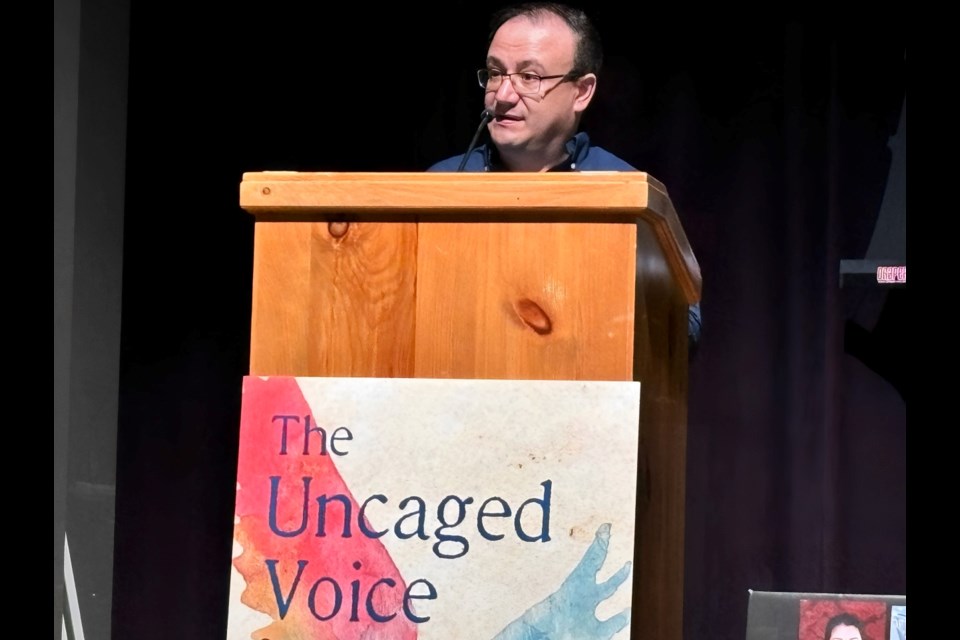NEWMARKET - Pedro Restrepo and his family were forced to flee their home in Colombia after his father was killed for voicing political beliefs against a corrupt and repressive government.
He was one of 15 writers who shared their experiences as immigrants to Canada in a new book, The Uncaged Voice - Stories by Writers in Exile. He was joined by editor and novelist Keith Ross Leckie, Newmarket resident and Syrian journalist Abdulrahman Matar, former Turkish reporter Arzu Yildiz, and Ethiopian filmmaker Gezahegn Mekonnen Demissie at Old Town Hall on June 18. A small but rapt audience listened to their stories, and some later expressed the need for their experiences to be shared with community members and Canadians at large, particularly young people.
“It was a difficult time because my family was divided,” Restrepo told NewmarketToday. “My mother went to the U.S. with my brother, and I had to go to Mexico. We were in danger and I was displaced.”
Restrepo worked with non-government agencies in Colombia to bring communities out of poverty and provide children with opportunities they wouldn’t have otherwise, he said, as illegal mining groups and gangs would stop them.
“I know cases of people in local churches that went there to promote initiatives to help teenagers, prevent drugs, and they have been killed,” said Restrepo. “This is unfortunate and the authorities don’t help much to fix the problem.
“The problem is there are gangs and groups and narcotraffickers have fuelled those groups. They fight for their own interest and not for the communities.”
Restrepo is a writer, journalist, interpreter, and human rights activist. He is the author of poetry books, a novel and works on pedagogy. He writes poems to express his sadness and feelings. He said poetry is his medicine.
“It was the way I can heal my wounds,” said Restrepo. “I decided to write and share my thoughts and my experience in a constructive manner.”
He currently works as a manager for R&M International Services, a company that provides educational training projects focused on teaching English and Spanish in Canada. He has won several literary and journalistic awards. He wrote Arcadio, a Novel, and two books of poetry, Sombras y Poesía and Cantos de Almas.
“My country is a beautiful one but we have been at war for 50 years. It is very difficult to advocate for any social cause. The extremes are very violent in the country. When you decide to work on a social cause, it is a dangerous task.”
Abdulrahman Matar advocated for human rights, freedoms, civil society, culture and literature. He said his home country has been ruled by a dictatorship that has imposed strict control over political activity, restricted all political and economic freedoms, civil organizations have been banned, paramilitary organizations created, and strict censorship imposed on writers and journalists on freedom of expression.
“Syria has been a country ruled by ... arrests, torture, and death in prisons,” said Matar. “Syrians live in a state of real terror, and constant fear. It also imposed an economic and trade policy that led to the accumulation of wealth in the hands of the regime and its loyalists, which led to widespread corruption and poverty.”
He wrote five books: Blood is not Red, Rain Leaves, The Evening Rose, Mediterranean Studies, and Wild Mirage. The books detail his experiences in political imprisonment, torture, deprivation, abuse and oppression.
“From severe beatings to kicking all over my body and head, I was like a ball between the jailers’ boots,” said Matar. “I hung on the wall, naked, with the torture continuing, tying my hands behind my back for several days.”
Matar has been arrested five times for exercising his freedom of expression and spent nearly 10 years in prison in Syria. He was subjected to unexpected forms of torture and was even placed in solitary confinement.
“In solitary confinement, there are indescribable forms of torture, which other prisoners, more than me, have experienced, including rape of men and women,” said Matar. “I am a lucky person because I survived death under torture. I survived to write and tell stories.”
Matar currently works a night shift at Magna International Inc. He has been looking for ways to publish his life story, pitching ideas to multilingual and ethnic media outlets.
The book's title, The Uncaged Voice, captures the idea of freedom of expression by those who had been silenced.
“We share stories because there are still thousands around the world who are detained for freedom of expression,” said Matar. “We share stories for freedom, for a future free from torture and deprivation of human rights.”
He continues writing poems and hosts literary events for the Arab diaspora in Canada.



